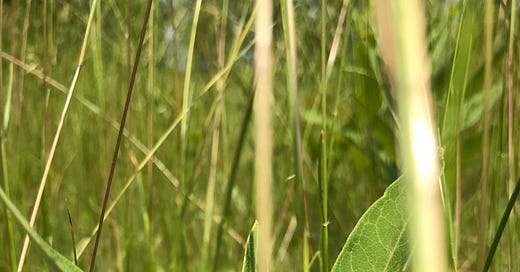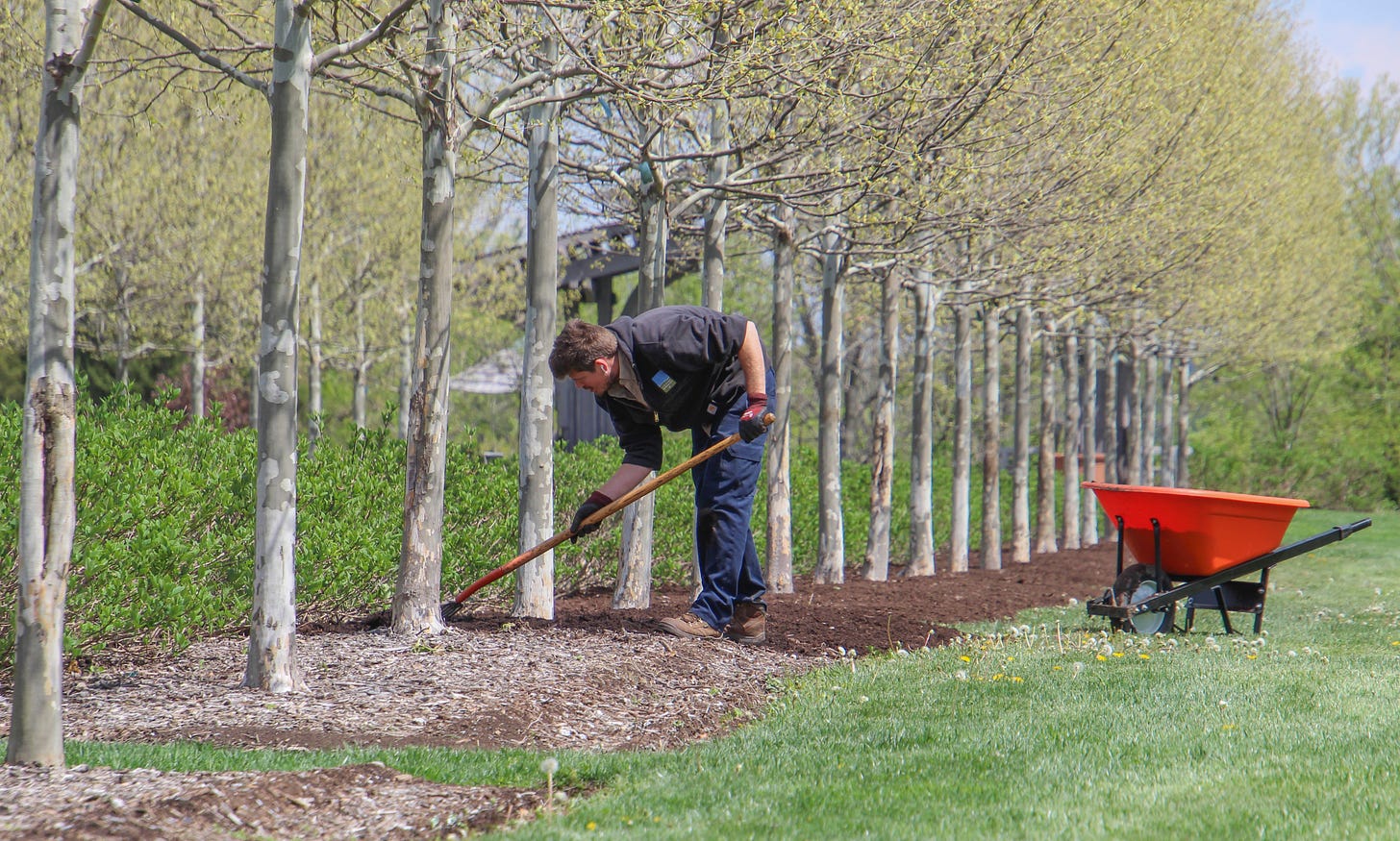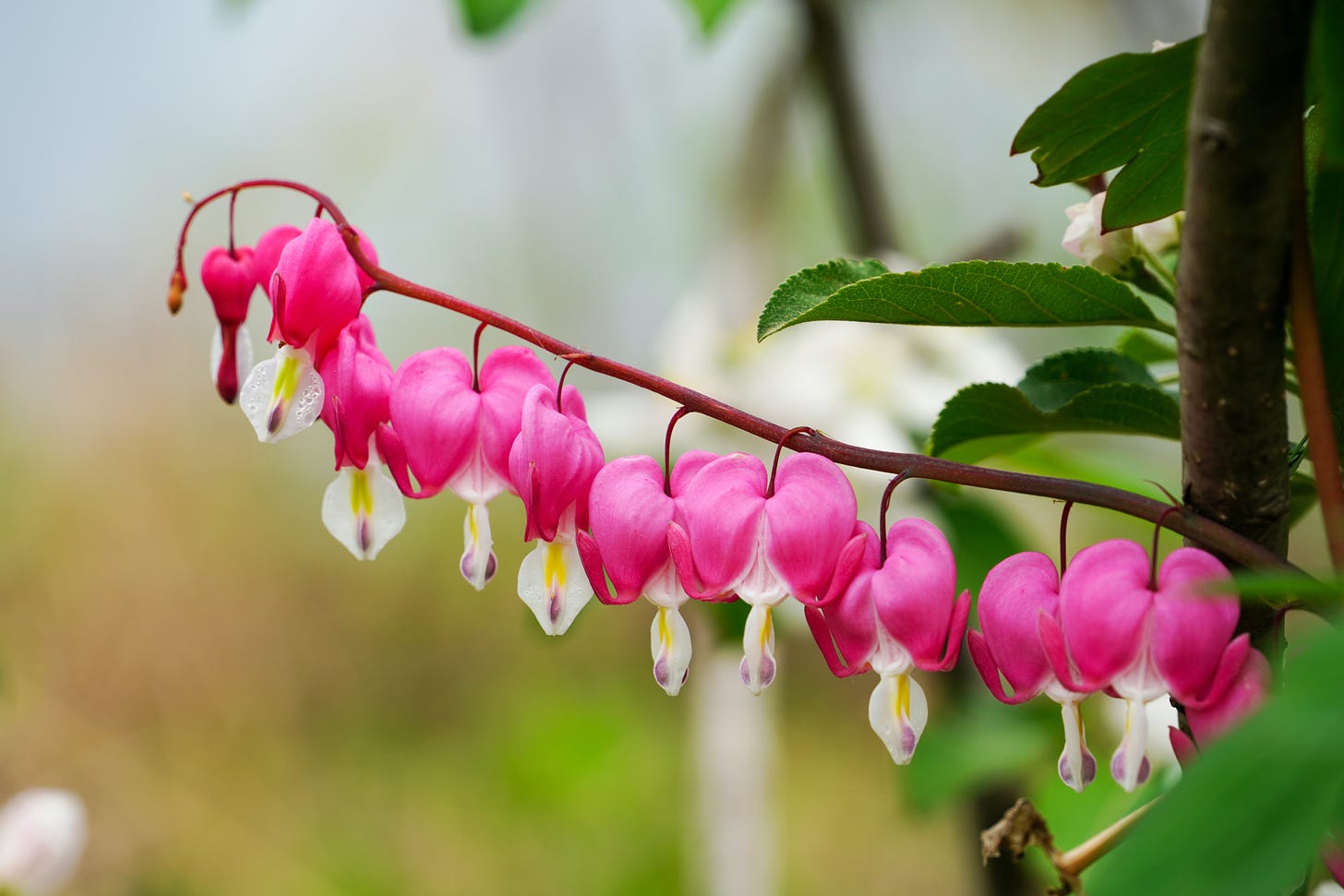How to Have Hope During Ecological Crisis
I am migrating my previous blog posts from my website to Substack. This first post is a good reminder of what hope means, particularly in this time when wildfire smoke is blocking out the sun
Welcome! I am Jessica Hetherington, and this newsletter is about faith and climate action. You can subscribe by clicking here:
How to Have Hope During Ecological Crisis
This was my first blog post for Following in the World, marking the launch of my website and the formal launch of my ecotheology ministry in June 2022.
I want to begin where so many conversations go when I talk with people about the ecological crisis and the need to respond as people of faith: the question of hope. How can we have hope in the face of the ecological crisis? How can we have hope in a world of global warming that is increasing unabated? How can we have hope when species are going extinct, places are becoming uninhabitable for both animals and people, water and air pollution are rising, and more? Where is there hope when humanity is on a crash course to catastrophe?
In this post, I begin to answer the question of how we can have hope, and where we can find hope, during ecological crisis. I offer a careful definition of hope and explore how hope can propel us forward in responding to the ecological crisis.
Hope: A Fundamental Part of Being Human
The good news is that hope is, in fact, a fundamental part of being human, regardless of what crises face us. Hope is an essential part of how we understand ourselves in the world: who we are, where we came from, where we are going, and what it all means. Hope is how we function, moving forward in a world full of unknowns. Even today, in this time of ecological crisis, hope is how we can move forward.
But Isn’t Hope Just Putting on Rose-Coloured Glasses?
It might seem like having hope in a world with such ecological devastation is a bit like putting on rose-coloured glasses; being cheerful no matter what the evidence tells us. That isn’t the case, however. To better understand what hope is, it helps to distinguish it from other human experiences, such as optimism, blind faith and utopia.
Hope is not optimism. Optimism is the tendency to expect the best outcome, that things will work out, or to dwell on the best possible outcome. I don’t know about you, but I am not feeling particularly optimistic about our ability to turn climate change around or restore biodiversity.
Hope is not blind faith. Blind faith is the unquestioning acceptance of what you are told, whether it’s within religion, politics, or mainstream culture. Blind faith is part of what has gotten us into the mess we are in right now.
Hope is not utopia. Utopia is the image of an ideally perfect place, especially in social, political and moral dimensions; it is, by definition, an impractical, idealistic scheme for social and political reform. I am not judging utopia; we need to be able to envision the best possible world and move toward that vision. But hope is not the wishing for or imagining of utopia; hope is, instead, grounded in the realities of the here and now, which for us includes the reality of the ecological crisis.
The Opposite of Hope: Cynicism and Despair
While we are talking about what hope isn’t, let’s also get at the opposite of hope. What emotions fill the vacuum when we do not have hope? Two of these include cynicism and despair.
Cynicism is defined as an attitude of scornful or jaded negativity; it can prevent or deny hope from flourishing, or snuff it out before it gets a chance to develop. Have you noticed cynicism in media around climate change, for example?
Despair is to be overcome by a sense of futility or defeat. It is the complete loss of hope, the absence of hope. Despair is highly prevalent in our world today. I wonder if despair is contagious.
So What, Then, is Hope?
I have now described what hope is not, and what human emotions can exist in the absence of hope. But what, precisely, is hope? Vaclav Havel, a Czech statesman and playwright, described hope this way:
“Hope, in the deep and powerful sense of the word, is the ability to work for something because it is good, not just because it stands a chance to succeed. …It is not the same as optimism; it is not the conviction that something will turn out well, but the certainty that something makes sense regardless of how it turns out.”[*]
Hope, Havel tells us, is the ability to work for something because it is good; this is an understanding of hope that is both deeply existential and unrelentingly concrete. Let me break it down further, into its existential and concrete dimensions.
Hope is Both Existential and Concrete
Since hope is, indeed, the ability to work for something because it is good, there is an existential dimension of hope embedded in the human yearning for the good, for something better than we are experiencing now. Hope is embedded in the belief that all of life, including suffering and tragedy, has meaning.
At the same time, hope is defined by its concrete expression in the world. I am going to spend more time talking about this in a moment, but it is important to recognize now that this is one of the critical aspects of hope that distinguishes it from optimism, blind faith and utopia. Further, hope’s expression in concrete ways is what makes it the antidote to experiences like cynicism and despair.
A Christian Understanding of Hope
Hope is not uniquely religious, and it certainly isn’t uniquely Christian. That being said, German theologian Jürgen Moltmann has articulated a Christian understanding of hope that is helpful for those of us who are Christian and looking for hope in the face of the climate crisis.[†] (If you are not Christian and this also resonates with your tradition, I would love to hear from you.)
Moltmann asks two questions: What does hope mean in the midst of suffering? How are Christians to understand hope? To answer these, he interprets hope in light of the ‘last things’ in theology, what is called eschatology, and refers to primal questions: Where are we going? What happens after we die? How do we make sense of death? For Christians, the death and resurrection of Jesus is central to answering these and other questions. Among other things, Jesus’ death on the cross and his resurrection can be interpreted that death does not have the final say. Death does not have the last word. Death does not win out in the end.
What does this have to do with hope? We are in a world of evil and suffering, tremendous suffering, in both humanity and nature. In Jesus’ time, he was tortured and executed by state powers. Yet, the life and ministry of Jesus demonstrate to us that love lived out in concrete, practical ways is what will win out in the end. Love of neighbour, shown through practices of feeding, healing and showing compassion for the oppressed and the weak; love of nature, shown through reduction of greenhouse gases and so many other acts of ecological reparation: these are what will contribute to the transformation of the world.
Is this all that is required? In Christian faith, no. There is a larger piece, the power of God’s love, which is fulfilled in the resurrection. The resurrection teaches us about the transformative power of God’s love. But without the everyday, concrete practices of love for neighbour and nature, transformation is impossible. Hope is about recognizing this power of God’s love, the power of love to transform through concrete acts. It is about a power larger than our individual selves, larger than our greed and our selfishness, our broken ways of relating.

The Possibility of New Experiences
Hope is about the possibility of new experiences than those we are experiencing now; new realities than the ones before us in this moment. Hope faces the contradiction that exists between the evil and suffering of the world and the promise of a transformed world. Unlike utopia, blind faith or even optimism, which are all looking away from the contradictions toward something else, hope faces the suffering and the pain and moves into action.
Hope in Action
Hope, in a nutshell, works for change. If we are not living our hope out in concrete expression in our thoughts and then in our actions, it is not hope. Hope is not effective if it is not acted upon. This is what is so powerful and transformative about hope! And it is in this way, as people of faith, that hope participates in koinonia, communion with God through our human and nature connections.
So how does hope work? How does it operate? Lisa Sowle Cahill is a Christian ethicist who has experience working with Christian peacemakers on the ground in war-torn environments. She has learned this:
“Hope is a practical virtue. It is a virtue of the will that disposes us to act for a future good that is difficult to attain, but not impossible. Hope is not blind trust that ‘everything will work out for the best’ despite all evidence to the contrary. …Hope depends on practical action, steps that are taken to change situations of difficulty or despair.”[‡]
Environmental educator David Orr describes hope as “a verb with its shirtsleeves rolled up.” In other words, hope is getting out there and doing the necessary hard work. Hope, indeed, is more than an emotion; we can engage in hopeful acts even when we are not feeling particularly hopeful. Hope demands action; hope must be lived out in our actions. Buddhist scholar and activist Joanna Macy says that hope arises in action; it comes out of action.[§] In other words, we have a reinforcing loop: we must act in hope; in turn, our actions give rise to more hope. And so it continues, back and forth, building upon itself.
Hope During Ecological Crisis
What we have, then, is a dynamic understanding of hope lived out in action that, for Christians, participates in the wider hope of the resurrection. What can this hope look like specifically in our time of ecological crisis?
We have learned that hope isn’t about how we feel. When we confront the data on climate change and the inaction of governments around the world, hopefulness is not usually the first emotion that comes up. Instead, hope is about how we act, and so when we witness to ecological movements around the world, led by youth, we witness hope in action. When we engage in climate change activism in our communities, we are acting in hope. When we make changes in our lifestyles, in tandem with the wider efforts necessary, we are being hopeful.
My question for you, then, is where is hope for you, in this time of ecological crisis? Where is the hope in action? Where are you being hopeful with your thoughts and your actions? What can you do, today and tomorrow, to witness to a Christian hope of transformation that comes through concrete, practical steps? What can you do, today and tomorrow, to confront the reality that we are in and create new experiences? I invite you to share your answers in the comments below, and any thoughts that you have about how you have experienced hope in your life. How can hope carry you forward now, in a world so in need of ecological reparation and healing?
[*] Vaclav Havel, Disturbing the Peace: A Conversation with Karel Huizdala (New York: Vintage, 1991), 181-182.
[†] Jürgen Moltmann, Theology of Hope: On the Ground and the Implications of a Christian Eschatology (London: SCM Press Ltd, 1967), pp. 15-36. Available online at: http://media.sabda.org/alkitab-2/Religion-Online.org%20Books/Moltman%2C%20Jurgen%20-%20Theology%20of%20Hope.pdf. Accessed April 14, 2022.
[‡] Lisa Sowle Cahill, “A Theology for Peacebuilding,” CPM Conference, University of Notre Dame, April 2008, p. 14.
[§] Joanna Macy and Chris Johnstone, Active Hope: How to Face the Mess We’re in without Going Crazy (Novato, CA: New World Library, 2012).









Where do I find hope? I look to Hebrews, to "the hope that lies before us... a strong and trustworthy anchor for our souls" (6:18-19, NLT) It's founded on God's faithfulness, his trustworthy promise for the future in His inner sanctuary, into which Jesus leads us as our eternal High Priest. This hope is one of action; in faith we are invited to walk alongside Christ as he renovates the world, participating with him in that creative work. Today and tomorrow I can read and think and talk and do, digging my fingers into soil, building relationships, and cultivating beauty. "If the Lords wills, we will live and do this or that" (James 4:15, NIV)
I am so grateful to have discovered your work. Your posts are becoming part of a body of research I'm reading as I write my next novel. Thank you for your careful and thoughtful exploration of the intersection between ecology and faith.